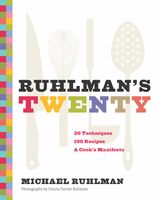Advertisement
Salting Meats
Appears in
Published 2011
One of the most powerful uses of salt is on meat. When to salt may be the most influential factor in salt’s overall impact on the meat. In most cases, you can’t salt meat too early. I recommend you salt your meat as soon as you bring it home from the store and then wrap it up. The salt will dissolve and penetrate the muscle so that the meat is uniformly seasoned inside and out. The old-school French guys will tell you not to salt early because doing so sucks out the juices. This is not a valid point. It’s mainly water that’s being drawn out, thus concentrating the meat flavor, not vitiating it. Salting early has an additional health and flavor benefit in that it inhibits spoilage bacteria. If you brought home some fresh pork chops and you salted one immediately but did not salt the other, and left them in the refrigerator for a week, the unsalted pork chop will likely have begun to develop off odors and will feel faintly slimy. The salted pork chop will escape those fates because it has, in a sense, been mildly cured, or preserved.


